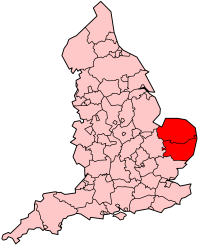East Anglia
|
|

East Anglia is a region of eastern England, named after one of the ancient Anglo-Saxon kingdoms, which was named after the homeland of the Angles, Angeln in northern Germany. Its boundaries are not rigidly defined, but it includes the counties of Norfolk and Suffolk, with part or all of Cambridgeshire and Essex, and a small part of southern Lincolnshire bordering The Wash. Some of the area is characterised by its flatness, consisting of fenland and reclaimed marshland, though much of Suffolk comprises gently rolling hills. East Anglia forms part of the East of England administrative region.
Arable farming and horticulture have proven very successful in this fertile country. The landscape has been heavily influenced by Dutch technology, from the influx of clay pantiles to the draining of the fens. It has a wide range of small-scale holiday destinations ranging from traditional coastal resorts, through historic towns such as Bury St Edmunds, Cambridge and Ely to the modern holiday villas of Center Parcs set in Thetford Forest. The military constructed many airfields during World War II and a few of these remain in use. One, near Norwich, has become a civilian airfield to serve the city.
The Norfolk Broads, now part of The Broads National Park, form a network of waterways between Norwich and the coast and are popular for recreational boating.
The University of East Anglia lies a few miles west of Norwich. Norwich is one of the largest cities in East Anglia, but the East of England regional assembly is based in Essex.
History
The Kingdom of the East Angles, formed about the year 520 by the merging of the North and the South Folk, was one of the seven Anglo-Saxon heptarchy kingdoms (as defined in the 12th century writings of Henry of Huntingdon). For a brief period following a victory over the rival kingdom of Northumbria around the year 616, East Anglia was the most powerful of the Anglo-Saxon kingdoms of England, and its king Raedwald was Bretwalda. But this did not last: over the next forty years, East Anglia was defeated by the Mercians three times, and it continued to weaken relative to the other kingdoms until in 794, Offa of Mercia had its king Aethelbert killed and took control of the kingdom himself.
The independence of the East Anglians was restored by a successful rebellion against Mercia (825 - 827), in course of which two Mercian kings were killed attempting to crush it. On November 20, 870 the Danes killed King Edmund and took the Kingdom, which they named East Anglia (see Ivar the Boneless). The Saxons retook the area in 920, only to lose it again in 1015-1017, when it was conquered by Canute the Great and given as a fiefdom in 1017 to Thorkel the High.
Much of East Anglia (including parts of Cambridgeshire, Lincolnshire, west Norfolk, and Suffolk), consisted of marshland and bogs until the 17th century despite the construction of early sea barriers by the Roman Empire. During the 17th century the alluvial land was converted into arable land by means of systematic drainage using a collection of drains and river diversions.
See also
| The Heptarchy |
|---|
| East Anglia | Essex | Kent | Mercia | Northumbria | Sussex | Wessex |
de:Ostanglien fr:Est-Anglie ja:イースト・アングリア nl:East Anglia no:East Anglia
